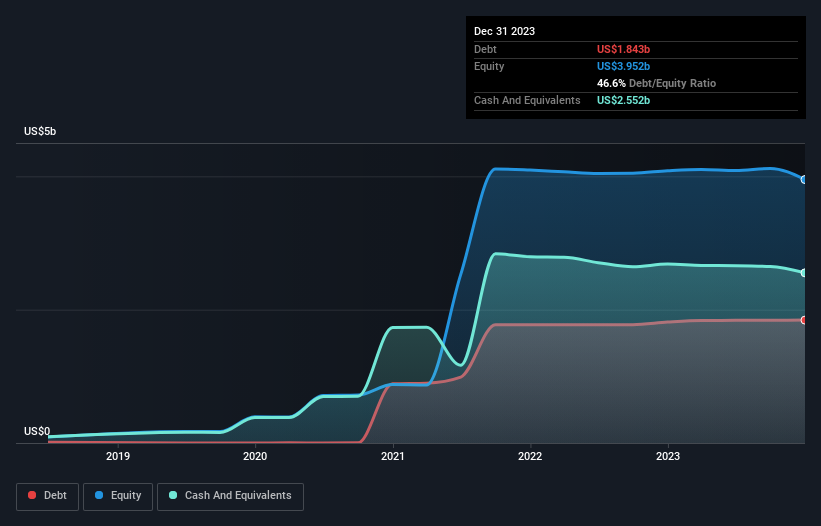
Legendary fund manager Li Lu (who Charlie Munger backed) once said, 'The biggest investment risk is not the volatility of prices, but whether you will suffer a permanent loss of capital.' When we think about how risky a company is, we always like to look at its use of debt, since debt overload can lead to ruin. Importantly, BILL Holdings, Inc. (NYSE:BILL) does carry debt. But should shareholders be worried about its use of debt?
Why Does Debt Bring Risk?
Debt and other liabilities become risky for a business when it cannot easily fulfill those obligations, either with free cash flow or by raising capital at an attractive price. Part and parcel of capitalism is the process of 'creative destruction' where failed businesses are mercilessly liquidated by their bankers. However, a more usual (but still expensive) situation is where a company must dilute shareholders at a cheap share price simply to get debt under control. By replacing dilution, though, debt can be an extremely good tool for businesses that need capital to invest in growth at high rates of return. The first thing to do when considering how much debt a business uses is to look at its cash and debt together.
View our latest analysis for BILL Holdings
What Is BILL Holdings's Net Debt?
As you can see below, BILL Holdings had US$1.84b of debt, at December 2023, which is about the same as the year before. You can click the chart for greater detail. But it also has US$2.55b in cash to offset that, meaning it has US$709.0m net cash.

A Look At BILL Holdings' Liabilities
We can see from the most recent balance sheet that BILL Holdings had liabilities of US$4.12b falling due within a year, and liabilities of US$1.80b due beyond that. On the other hand, it had cash of US$2.55b and US$551.2m worth of receivables due within a year. So its liabilities total US$2.82b more than the combination of its cash and short-term receivables.
While this might seem like a lot, it is not so bad since BILL Holdings has a market capitalization of US$6.88b, and so it could probably strengthen its balance sheet by raising capital if it needed to. But we definitely want to keep our eyes open to indications that its debt is bringing too much risk. Despite its noteworthy liabilities, BILL Holdings boasts net cash, so it's fair to say it does not have a heavy debt load! The balance sheet is clearly the area to focus on when you are analysing debt. But it is future earnings, more than anything, that will determine BILL Holdings's ability to maintain a healthy balance sheet going forward. So if you want to see what the professionals think, you might find this free report on analyst profit forecasts to be interesting.
Over 12 months, BILL Holdings reported revenue of US$1.2b, which is a gain of 39%, although it did not report any earnings before interest and tax. With any luck the company will be able to grow its way to profitability.
So How Risky Is BILL Holdings?
While BILL Holdings lost money on an earnings before interest and tax (EBIT) level, it actually generated positive free cash flow US$219m. So taking that on face value, and considering the net cash situation, we don't think that the stock is too risky in the near term. One positive is that BILL Holdings is growing revenue apace, which makes it easier to sell a growth story and raise capital if need be. But that doesn't change our opinion that the stock is risky. When analysing debt levels, the balance sheet is the obvious place to start. But ultimately, every company can contain risks that exist outside of the balance sheet. Case in point: We've spotted 1 warning sign for BILL Holdings you should be aware of.
Of course, if you're the type of investor who prefers buying stocks without the burden of debt, then don't hesitate to discover our exclusive list of net cash growth stocks, today.
Valuation is complex, but we're here to simplify it.
Discover if BILL Holdings might be undervalued or overvalued with our detailed analysis, featuring fair value estimates, potential risks, dividends, insider trades, and its financial condition.
Access Free AnalysisHave feedback on this article? Concerned about the content? Get in touch with us directly. Alternatively, email editorial-team (at) simplywallst.com.
This article by Simply Wall St is general in nature. We provide commentary based on historical data and analyst forecasts only using an unbiased methodology and our articles are not intended to be financial advice. It does not constitute a recommendation to buy or sell any stock, and does not take account of your objectives, or your financial situation. We aim to bring you long-term focused analysis driven by fundamental data. Note that our analysis may not factor in the latest price-sensitive company announcements or qualitative material. Simply Wall St has no position in any stocks mentioned.
About NYSE:BILL
BILL Holdings
Provides financial operations platform for small and midsize businesses worldwide.
Adequate balance sheet and slightly overvalued.
Similar Companies
Market Insights
Community Narratives




